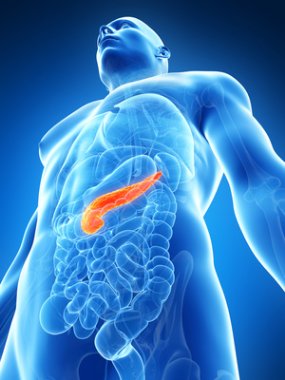Alcohol abuse impairs the uptake and utilization of vitamins
- increasing your risk of pancreatitis and other complications
 A new American study shows that chronic alcohol abuse impairs the ability of the pancreas to absorb vitamin C, and that increases the risk of infection of the pancreas (pancreatitis) and other diseases. Lack of certain B vitamins may also damage the pancreas and increase the risk of encephalitis.
A new American study shows that chronic alcohol abuse impairs the ability of the pancreas to absorb vitamin C, and that increases the risk of infection of the pancreas (pancreatitis) and other diseases. Lack of certain B vitamins may also damage the pancreas and increase the risk of encephalitis.
The pancreas produces enzymes that help digest your food. Also, it makes hormones such as insulin and glucagon that are important for your carbohydrate metabolism. Therefore, diseases of the pancreas may lead to digestive problems and diabetes.
It is estimated that alcohol-related diabetes takes around 10 years to develop, and the risk increases in step with a person's alcohol consumption. Earlier studies show that long-term alcohol abuse leaves the pancreas more vulnerable to damage, but as only 10 percent of alcoholics develop pancreatitis, genetic and environmental factors are also believed to be involved.
Poor utilization of vitamins makes the pancreas more vulnerable
In order for the cells of the pancreas to be able to carry out their different tasks, vitamins and minerals are required. The body collects these nutrients from the bloodstream. Researchers from University of California, headed by Hamid Said, PhD, set out to study if the pancreas' impaired resistance towards alcohol is in some way related to poor cellular absorption of vitamins. Earlier studies had shown that chronic alcohol abuse prevents pancreatic cells from absorbing biotin (B7) and thiamin (B1), and the aim of the new study was to see if chronic alcohol abuse also impaired the ability of the pancreas to absorb vitamin C.
Specific protein transports vitamin C into the pancreatic cells
To begin with, the team of researchers found that a protein called sodium-dependent vitamin C transporter 2 (SVCT-2) has the main responsibility for conveying vitamin C into the pancreatic cells. Then, the researchers exposed mouse pancreas cells to levels of alcohol that corresponded with the levels one would find in human alcoholics. The researchers also fed mice a diet where 25 percent of the calories came from alcohol. They observed that both the pancreas cells from mice that were exposed to alcohol directly and mice on an alcohol diet had lower SVCT-2 levels, which blocked the vitamin C absorption of the pancreas cells.
According to Hamid Said, having reduced levels of vitamin C and other vitamins in the cells impairs the normal functions of the pancreas. This leaves the cells more vulnerable to secondary damage, while increasing the risk of pancreatitis (infection of the pancreas) and other diseases. The study is published in The American Journal of Physiology.
Alcohol only contributes with calories. It does not contain nutrients, which the body's cells need in order to convert calories into energy
Low brain levels of thiamin may cause life-threatening encephalitis
Long-term alcohol abuse may cause a thiamin (vitamin B1) deficiency in the brain and Wernicke's encephalopathy, which is an acute and life-threatening brain infection. Amphetamine and methylphenidate (Ritalin) abusers are also at risk. Symptoms include disorders of consciousness, speech impairment, walking disturbances, and death in worst case.
Korsakoff syndrome is often seen in connection with Wernicke's encephalopathy, and the disease is characterized by permanent memory flaws. Both Wernicke's encephalopathy and Korsakoff syndrome are treated with high-dosed injections of vitamin B1.
Relevant supplements for alcoholics
Because alcohol is devoid of nutrients and interferes with the cellular uptake of vitamins, alcoholics should at least try to compensate for their nutrient deficit by taking relevant supplements like vitamin C and strong B vitamins.
References
American Physiological Society. Chronic drinking interferes with absorption of critical vitamins by pancreas. ScienceDaily 2016
https://www.sciencedaily.com/releases/2016/05/160512085348.htm
http://www.netdoktor.dk/vitaminer/vitaminb1.htm
Search for more information...
- Created on .








